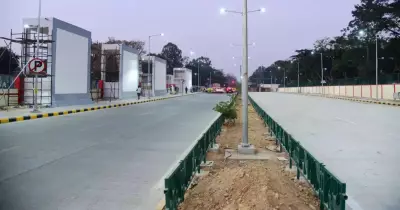
Haryana's much-touted modern property registration system, launched as a citizen-friendly digital initiative, has been plagued by technical glitches that have significantly slowed down operations across several tehsils in the state. The paperless system, implemented on November 1, 2025, has faced numerous challenges that have left both residents and officials struggling during the initial rollout phase.
Technical Hurdles Slow Registration Process
The extent of the slowdown became evident in Panchkula district, where a single tehsil managed to complete only 16 property registrations over 12 days, a stark contrast to the previous average of 20-22 registrations per day under the old manual system. This dramatic reduction in processing speed has prompted urgent intervention from the state's Revenue Department.
Financial Commissioner (Revenue) Dr. Sumita Misra convened an emergency meeting with all deputy commissioners on Thursday, directing them to streamline procedures and resolve the technical issues hampering the online registration process. The system, which was described as "a historic leap" from the 58-year-old manual registration process, has failed to deliver the promised seamless experience during its initial weeks of operation.
Citizens Face Practical Challenges
Property owners and agents attempting to use the new system have reported multiple practical difficulties. One case involved a farmer and a resident from Panchkula villages who spent four days just uploading documents before their agricultural land property could be registered on Thursday. "We had come early in the morning but the portal became functional only after 1 pm," revealed an associate involved in the transaction.
Contrary to the paperless promise, users still need to print copies of all documents before uploading PDF versions to the portal. Jaipal Singh, a resident of Chandimandir, found himself unable to proceed with selling his agricultural land because the portal lacked records of his property.
System Design Flaws Emerge
Local property registration agents have identified several design flaws in the new system. "In the case of group housing society deals, the portal asks for the ID of Haryana Shehri Vikas Pradhikaran (HSVP), which is difficult for a common man to obtain," explained one agent. There's also a mismatch in land measurement parameters, with HSVP using square yards while urban local bodies use square metres.
The system appears to have incorporated incorrect procedural requirements. "For any lease deed registration, the portal asks for permission from HSVP, though no such provision actually exists," the agent added. Traditional land measurement units like bigha and biswa aren't recognized in areas where consolidation hasn't been completed, creating additional complications.
Another agent highlighted peculiar system behaviors: "In land exchange cases, gair mumkin (non-cultivable) land is treated as commercial land, whereas earlier such exchanges were free of cost. Sometimes, the portal even picks villages outside the concerned tehsil, which causes confusion."
Official Response and Improvement Measures
Revenue officials acknowledge the teething problems but emphasize that resolutions are underway. A Panchkula revenue official noted, "Being a new system, technical issues do arise but they are resolved. The number of registrations has also started picking up—on Tuesday, seven registrations were completed in a single day."
Help desks have been established to assist citizens, and during Thursday's video conference, Financial Commissioner Misra directed deputy commissioners to set up dedicated help desks at every tehsil and appoint nodal officers whose contact details must be publicly available.
Additional measures include the immediate launch of a state-level helpline number for real-time support and an automatic 72-hour document saving feature to prevent data loss. Registration fees will remain applicable throughout the process until completion.
Registration Statistics Show Mixed Picture
Reviewing performance data from November 1 to November 12, Dr. Misra reported that 5,334 applications were received statewide, with 2,110 deeds approved. The breakdown showed 915 applications under submission, 611 approved by Sub-Registrars, and 626 rejected due to documentation or technical errors.
Officials highlighted that compared to the previous review period from September 29 to October 31—which recorded only 1,662 applications and 1,074 approvals—both applications and approvals have more than doubled, indicating rapid adaptation to the digital platform despite the challenges.
District-wise performance showed Kurukshetra leading with 810 applications and 524 approvals, followed by Mahendragarh (428 applications, 205 approvals), Karnal (409 applications, 208 approvals), and Jind (384 applications, 131 approvals). Faridabad, Gurugram, and Yamunanagar reported steady growth, while Sirsa, Charkhi Dadri, and Panipat are expected to improve as users become more familiar with the new system.
Dr. Misra noted that only seven of the twelve review days were effective working days, as five were consumed by document approval processes. She observed that the system is now stabilizing across tehsils, offering hope for smoother operations in the coming weeks.
The Deed Writer Welfare Association has suggested forming a five-member committee comprising association representatives and revenue department officials to further improve the newly launched system, indicating collaborative efforts to address the ongoing challenges.





